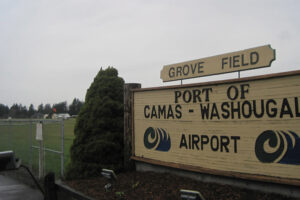The Port of Camas-Washougal is considering spending $100,000 for the design, engineering and permitting of an industrial park structure originally billed as an incubator building.
Port Chief Executive Officer David Ripp referred to the future Building 19, as a “smaller, incubator building” during the Oct. 15 port commission meeting.
Unlike a traditional incubator, tenants would not share space or resources.
During a follow-up phone interview, Ripp described the future Building 19 as a “small space where businesses can incubate and grow and hopefully expand to a larger space.”
Since the Building 19 tenants will not share office, clerical or meeting room space — as is customary with most business incubators — Ripp said it may not be an incubator building.
He thinks there will be three, 3,300-square-foot bays in the building to house three companies and provide 10 to 20 manufacturing, warehouse and/or food processing “family wage” jobs in the Washougal-based Steigerwald Commerce Center.

